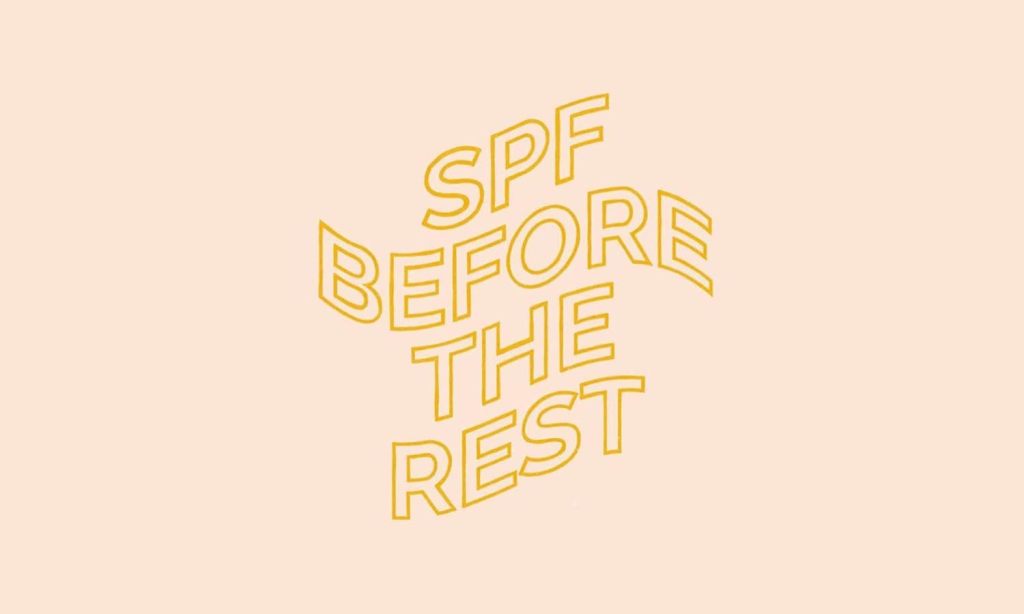Lisa Patulny founded Call Time On Melanoma (CTOM) as a platform to share ambassador Natalie Fornasier’s story at the end of 2018. At 20, Fornasier was diagnosed with stage three melanoma. Right now, at 26, she’s battling her third diagnosis.
“When I found out what Natalie was going through and looked into the statistics and facts myself, I realised that even though young women are at risk, no one was packaging this information and giving it to them in a way that they could relate to, or on the platforms in which they spend the most time,” she tells us.
Today, via the CTOM Instagram page and website, Patulny continues to drive change and bring awareness to the importance of SPF by re-framing sun safety as a form of self-care.
Through inspirational imagery and by engaging with like-minded influencers, CTOM challenges the idea that sun safety is ‘uncool’ or ‘daggy’.
“We also talk about sunscreen as part of your daily skincare routine, which is at odds with the idea that it’s only something you need to consider when going to the beach, and we refer to skin checks as a necessary appointment, placing it on the same level of importance as cervical screening tests and regular dental checkups.”
Patulny and CTOM work to challenge melanoma mythology with fact-based information and share first-person stories of women who’ve experienced melanoma to emphasise both the seriousness of skin cancer and also the importance of early detection.
Two in three Australians will be diagnosed with skin cancer by age 70
It’s a huge undertaking, but nevertheless vital for the women of Australia — many of who continue to spend time in the sun without SPF, be it walking the dog, or actively laying out for hours in the pursuit of a natural tan (something Patulny refers to as a “problematic beauty trend”).
“We’ve internalised the notion that ‘a tan equals beauty’ to such a great degree that there is a lot of cognitive dissonance going on. We do all of these things to be healthy in other aspects of wellness, and yet somehow there’s a huge number of us who fail to acknowledge the dangers of sun exposure and continue to tan.
“Even if you are lucky never to be diagnosed with skin cancer (which given the stats is unlikely), if you care about your skin health from a vanity perspective to appear youthful looking for as long as possible, then tanning really is the worst thing you can do,” says Patulny.
https://www.instagram.com/p/B7A8KeBgVdB/
Because of this disconnect, Patulny knows there’s still work to be done on bringing more Australian women to the CTOM platform, and furthering the education around sun safety and its relation to self-care.
“It’s going to take some time to educate the masses on the dangers, because even though my inner circle is diligent and aware, the content I see every day on social media tells me our message hasn’t penetrated far enough.
“Not to mention there are still so many people out there who are resistant to facts or have found what I would call ‘alternative facts’ online that support suntanning and also the idea that sunscreen is poison,” Patulny tells us.
One way CTOM plans on furthering this education is with influencers on Instagram.
https://www.instagram.com/p/B75ldIng5d6/
Of course, influencers and so many of us on social media curate the way we’re depicted.
For example, the only images of myself at the beach would have my followers think I’m promoting time in the sun without hats, shade and clothing to protect my skin, where in actual fact I’m usually hiding under whatever shelter I can find and exposing as little of myself to the sun as possible.
Talking to Patulny, I experienced my own realisation that even I, an SPF stan for life, was perpetuating this behaviour and immediately acknowledged that this really needed to change — and in order for the message to be delivered fast and on a large scale, Patulny says the movement must start with influencers.
“Influencers have massive platforms and can directly impact the products people purchase,” she says, adding: “There is work to be done in educating influencers so that they’re sharing fact-based information and ensuring the images that they post directly represent sun-safe behaviours.”
And if influencers and those of us on social media are posting photos at the beach or in the sun this summer, then Patulny urges us to share the real setting — umbrella and all —and not the staged shot that makes us appear as if we’re spending extended time in the sun.
“If we’re all talking about reframing sun safety as ‘cool’, for want of a better word, we need to show people what that looks like, because they haven’t yet seen it.”
Want to know more about the work Call Time on Melanoma is doing to re-frame sun safety as self-care? Check out the CTOM website here.







